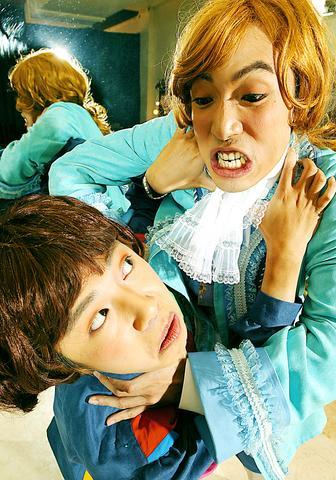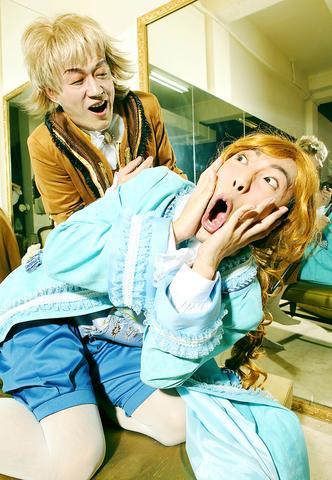A story of love, sex and death and all of it comical, Carlo Goldoni's The Venetian Twins is renowned for its slapstick and sometimes coarse humor. Starting tonight, audience members can expect anything but boredom from Performance Workshop's much anticipated Mandarin adaptation of the Italian comedy.
After seeing a dress rehearsal, it's easy to see what all the fuss is about as the show is full of energy, with a star cast and a script that's really funny.
First staged in the mid-18th century, The Venetian Twins is believed to have transformed traditional Italian comedy theater. Originally, actors agreed on a basic plot and a general idea of how it should be performed before going on stage. Their improvised performances were -- and often still are -- crass. Goldoni stuck with the humor, but relied less on improvisation and more on a scripted story.

PHOTO COURTESY OF PERFORMANCE WORKSHOP
Just how bawdy an adaptation is now depends on the director. Performance Workshop director, Zhong Xinzhi's (
This is the theater company's third adaptation of one of Goldoni's works. The first two, The Comedy of Sex and Politics and A Servant of Two Masters were rewritten and directed by Stan Lai (賴聲川).
Zhong's adaptation of The Venetian Twins, like those of Lai's, preserves the main story and time period of the original but slightly modifies the dialogue to heighten its comic relief for local theatergoers.

PHOTO COURTESY OF PERFORMANCE WORKSHOP
"You can get spaghetti in Taiwan, but it's not the same as if you ordered it in Italy, because it is made according to local tastes here. Of course we are doing an 18th century Italian comedy. We use authentic costumes and music, but we changed some of the dialogue to give it a Taiwanese flavor," Zhong said.
The program credits a list of top Taiwanese stage actors and production crew with Wei Yicheng (
Three years since the company's last staging of a Goldoni play, anticipation of this year's performance shows at the box office. There are only a few pricey tickets remaining for the weekend performances and weekday dates are selling quickly, the box office said.
Performance notes:
What: The Venetian Twins
Where: National Theater, 21-1 Zhongshan S Rd, Taipei (台北市中山南路21-1號).
When: July 30 to Aug. 7, at 7:30pm (no Monday evening performance).
Tickets: NT$300 to NT$1,800, available at CKS Cultural Center Box Office.

That US assistance was a model for Taiwan’s spectacular development success was early recognized by policymakers and analysts. In a report to the US Congress for the fiscal year 1962, former President John F. Kennedy noted Taiwan’s “rapid economic growth,” was “producing a substantial net gain in living.” Kennedy had a stake in Taiwan’s achievements and the US’ official development assistance (ODA) in general: In September 1961, his entreaty to make the 1960s a “decade of development,” and an accompanying proposal for dedicated legislation to this end, had been formalized by congressional passage of the Foreign Assistance Act. Two

Despite the intense sunshine, we were hardly breaking a sweat as we cruised along the flat, dedicated bike lane, well protected from the heat by a canopy of trees. The electric assist on the bikes likely made a difference, too. Far removed from the bustle and noise of the Taichung traffic, we admired the serene rural scenery, making our way over rivers, alongside rice paddies and through pear orchards. Our route for the day covered two bike paths that connect in Fengyuan District (豐原) and are best done together. The Hou-Feng Bike Path (后豐鐵馬道) runs southward from Houli District (后里) while the

March 31 to April 6 On May 13, 1950, National Taiwan University Hospital otolaryngologist Su You-peng (蘇友鵬) was summoned to the director’s office. He thought someone had complained about him practicing the violin at night, but when he entered the room, he knew something was terribly wrong. He saw several burly men who appeared to be government secret agents, and three other resident doctors: internist Hsu Chiang (許強), dermatologist Hu Pao-chen (胡寶珍) and ophthalmologist Hu Hsin-lin (胡鑫麟). They were handcuffed, herded onto two jeeps and taken to the Secrecy Bureau (保密局) for questioning. Su was still in his doctor’s robes at

Mirror mirror on the wall, what’s the fairest Disney live-action remake of them all? Wait, mirror. Hold on a second. Maybe choosing from the likes of Alice in Wonderland (2010), Mulan (2020) and The Lion King (2019) isn’t such a good idea. Mirror, on second thought, what’s on Netflix? Even the most devoted fans would have to acknowledge that these have not been the most illustrious illustrations of Disney magic. At their best (Pete’s Dragon? Cinderella?) they breathe life into old classics that could use a little updating. At their worst, well, blue Will Smith. Given the rapacious rate of remakes in modern